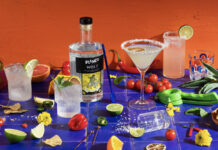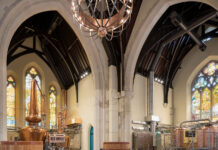One of our favorite Louisville bars for years was Meat, a unique haven for quality cocktails in a late-night setting upstairs in a former butcher shop. Although that now-closed bar supposedly has plans to reopen, its talent has moved on, with owners Jeremy Johnson (formerly of Meat) and Hanna Kandle (formerly at Relish and Basa) opening Meta in 2013.
What led to your path as a bartender/bar owner?
It’s kind of a twisty one! I toured with a band and was reasonably successful for 12 years or so but got really tired of sleeping on floors, wanted more stability and wanted to have a child. So, I initiated that [career change]. I had been a server/sommelier and stepped up to be a GM and beverage director to pay for it all. I really excelled at the bartending/creative aspect of it, and the more I learned about the classics the more I knew I’d be ok. I opened a previous bar, in a partnership that didn’t last, and got my shit together to do something myself with my partner, who I truly love, Hanna Kandle.
What do you consider your bar style and how does living in Louisville determine or affect that?
My bar style is extremely high end, but never condescending. You should be able to get a world class cocktail, but not be judged if you want a whiskey and Coke. You should feel like you’re in a beautiful space, but not be obligated to not feel safe having a good time. Yes, Louisville definitely affected that. We know what we expect but don’t judge. “Unless you’re a peer, and then, f— you.” Nothing but judgment. 😉
What is your philosophy on deciding what brands to stock at your bar and what mix do you prefer of large and small brands?
You know, I base what we stock on two distinct things: what do I love and what makes sense. I don’t have a strict formula on big vs. small. What I do have is a strong palate, a desire to treat others as I’ve been treated and distributor experience. The distributor experience gives me this: I’m never going to ask anyone to sell to me. That’s their job. If you don’t want to do your job then I have zero interest in your product. No matter how great your distillate is, you still need to make an effort. No one ever begged me when I was selling wine and booze in Chicago.
How do you educate customers on brands they might not have heard of?
I try to include unusual things in my recipes to encourage conversation. I prefer a slightly passive approach, until asked. I always quote a truly gifted former co-worker, Mike Rubel: “It’s good, weird stuff!”
What advice would you give to distilleries looking to be represented in quality cocktail bars?
Be respectful. Be honest. Sell. If you do quality work and you put it in front of people you respect, you will be ok. Honesty is key — especially if you’re a young distiller trying to sell older products. Don’t bullshit me. Tell me where you bought it, how old it is, etc. This is why I hold High West in such esteem — not only are they distilling some great stuff on their own, but they are transparent about what makes up their current aged lineup, as well as creative about owning their flavors. Awesome. Buy it for now, but make it your own. Also, no more vodka or botanical gins, please.
What are some US micro-distillers/small-batch brands that are exciting you right now?
High West is killing it. Also LOVE Copper & Kings and Koval.








